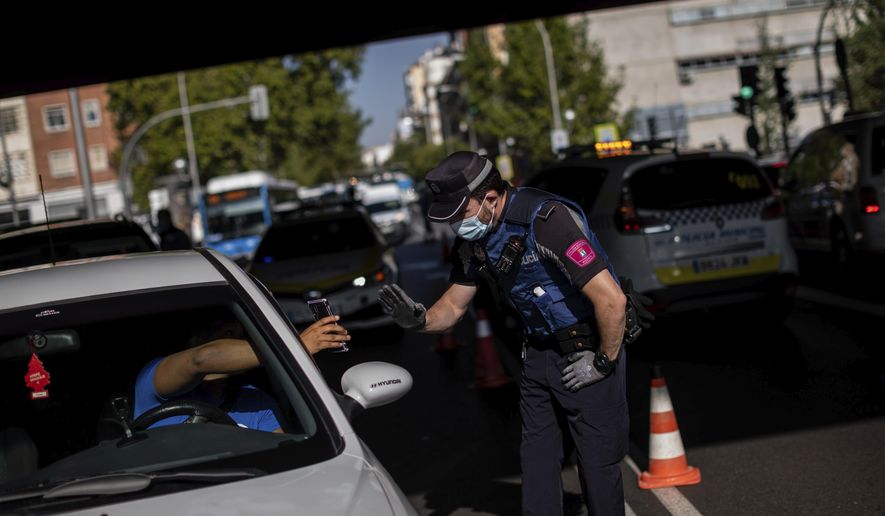LONDON (AP) - As the U.S. closed in on 200,000 coronavirus deaths Monday, the crisis deteriorated across Europe, with Britain working to draw up new restrictions, Spain clamping down again in Madrid and the Czech Republic replacing its health minister with an epidemiologist because of a surge of infections.
The push to reimpose tough measures in Europe to beat back a scourge that had seemingly been brought under control in the spring contributed to a drop on Wall Street. The Dow Jones Industrial Average shed nearly 510 points, or 1.8%, and the S&P 500 fell 1.2%.
In Britain, Prime Minister Boris Johnson is expected to announce a round of restrictions Tuesday to slow the spread of the disease. British Chief Medical Officer Chris Whitty warned that cases are doubling every seven days and could lead to a rise in deaths in the coming weeks.
The chief medical officers of England, Scotland, Wales and Northern Ireland raised the nation’s COVID-19 alert Monday from three to four, the second-highest level. More than 4,300 new infections were reported on Monday, a level not seen since early May.
“We have, in a very bad sense, literally turned a corner,” after weeks of rising infections, Whitty said.
In France, where infections reached a record high over the weekend with more than 13,000 new cases in 24 hours, health authorities opened new testing centers in the Paris region to reduce lines and delays. Italy added Paris and other parts of France to its COVID-19 blacklist, requiring travelers from those regions to show proof of a negative test or undergo testing on arrival.
And the Norwegian capital of Oslo banned gatherings of more than 10 people in private homes after a spike in cases and strongly urged people to wear face masks when traveling on public transportation amid a strike by bus drivers that forced many commuters to take the tram.
“The situation in Oslo is serious. This development must be stopped, and we have to do it now,” Mayor Raymond Johansen said.
Police in the Spanish capital of Madrid and its surrounding towns began stopping people going in and out of working-class neighborhoods that have been partially locked down to combat Europe’s fastest coronavirus spread.
Authorities said that starting on Wednesday, an estimated 860,000 residents must be able to show that their trips out of their neighborhoods are justified for work, study or medical reasons or face fines. Parks are closed and shops and restaurants in the affected zones are limited to 50% occupancy.
The targeted locations have some of the highest transmission rates in Europe. The measure has been met with protests from people who think the restrictions are stigmatizing the poor.
The German city of Munich, with one of the country’s highest infection rates, will allow only up to five people or members of two households to meet, and will restrict private indoor gatherings such as birthday parties, weddings or funerals to no more than 25 people.
The Czech Republic also faces the possibility of new restrictions after the government appointed epidemiologist Roman Prymula as health minister.
In the spring, the country recorded a relatively low number of COVID-19 cases and deaths compared with hard-hit Western European countries such as Italy, Spain and Britain.
But after the government lifted most of its restrictions over the summer, confirmed cases began making a comeback and reached a record high last week. On Thursday, the day-to-day increase of new cases was higher than 3,000, almost the same number it was in the entire month of March.
Prymula said over the weekend that the loosening of restrictions was done too quickly.
Elsewhere, the U.S. was on the verge of hitting 200,000 deaths, with health authorities deeply worried about the resumption of school and college and the onset of cold weather, which will force more people indoors. A widely cited model from the University of Washington predicts the U.S. death toll will double to 400,000 by the end of the year.
India recorded nearly 87,000 new coronavirus infections in the past 24 hours. The nation of 1.3 billion people now has over 5.4 million reported cases, and within weeks is expected to surpass the U.S., which has 6.8 million reported cases. Nevertheless, the Taj Mahal reopened to tourists for the time in six months, though visitors will have wear masks and undergo temperature screening.
Myanmar’s biggest city, Yangon, began its first day under a tightened lockdown because of a rise in cases. Only essential businesses can remain open.
But there were glimmers of good news: All virus restrictions are being lifted across much of New Zealand with the exception of Auckland, the largest city. Health authorities reported no new infections on Monday, and the number of active cases was put at 62. Prime Minister Jacinda Ardern said officials have “reasonable confidence we are on the right track.”
And in Africa, the surge in cases has been leveling off after the continent’s 54 countries joined an alliance praised as responding better than some richer countries, including the U.S. Over 33,000 deaths have been confirmed on the continent of 1.3 billion people.
___
Corbet reported from Paris. Associated Press writers Kirsten Grieshaber in Berlin; Jan M. Olsen in Copenhagen, Denmark; Karel Janicek in Prague; Aritz Parra in Madrid; Nicole Winfield in Rome; and Tammy Webber in Fenton, Michigan, contributed to this report.
___
Follow AP’s pandemic coverage at http://apnews.com/VirusOutbreak and https://apnews.com/UnderstandingtheOutbreak




Please read our comment policy before commenting.